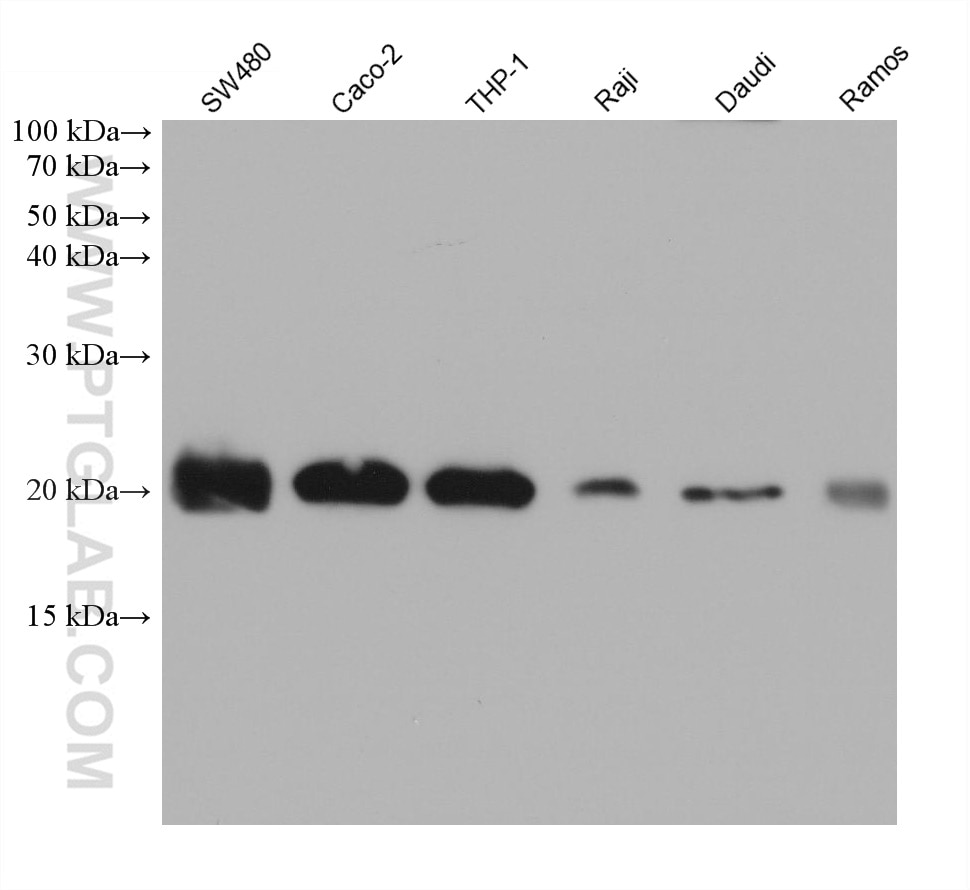Anticorps Monoclonal anti-BIK
BIK Monoclonal Antibody for WB, ELISA
Hôte / Isotype
Mouse / IgG2a
Réactivité testée
Humain
Applications
WB, ELISA
Conjugaison
Non conjugué
CloneNo.
1B1C10
N° de cat : 68438-1-Ig
Synonymes
Galerie de données de validation
Applications testées
| Résultats positifs en WB | cellules SW480, cellules Caco-2, cellules Daudi, cellules Raji, cellules Ramos, cellules THP-1 |
Dilution recommandée
| Application | Dilution |
|---|---|
| Western Blot (WB) | WB : 1:2000-1:10000 |
| It is recommended that this reagent should be titrated in each testing system to obtain optimal results. | |
| Sample-dependent, check data in validation data gallery | |
Informations sur le produit
68438-1-Ig cible BIK dans les applications de WB, ELISA et montre une réactivité avec des échantillons Humain
| Réactivité | Humain |
| Hôte / Isotype | Mouse / IgG2a |
| Clonalité | Monoclonal |
| Type | Anticorps |
| Immunogène | BIK Protéine recombinante Ag6353 |
| Nom complet | BCL2-interacting killer (apoptosis-inducing) |
| Masse moléculaire calculée | 18 kDa |
| Poids moléculaire observé | 20 kDa |
| Numéro d’acquisition GenBank | BC001599 |
| Symbole du gène | BIK |
| Identification du gène (NCBI) | 638 |
| Conjugaison | Non conjugué |
| Forme | Liquide |
| Méthode de purification | Purification par protéine A |
| Tampon de stockage | PBS avec azoture de sodium à 0,02 % et glycérol à 50 % pH 7,3 |
| Conditions de stockage | Stocker à -20°C. Stable pendant un an après l'expédition. L'aliquotage n'est pas nécessaire pour le stockage à -20oC Les 20ul contiennent 0,1% de BSA. |
Informations générales
The protein encoded by this gene shares a critical BH3 domain with other death-promoting proteins, such as BID, BAK, BAD and BAX, that is required for its pro-apoptotic activity, and for interaction with anti-apoptotic members of the BCL2 family, and viral survival-promoting proteins. Since the activity of this protein is suppressed in the presence of survival-promoting proteins, it is suggested as a likely target for anti-apoptotic proteins.
Protocole
| Product Specific Protocols | |
|---|---|
| WB protocol for BIK antibody 68438-1-Ig | Download protocol |
| Standard Protocols | |
|---|---|
| Click here to view our Standard Protocols |


